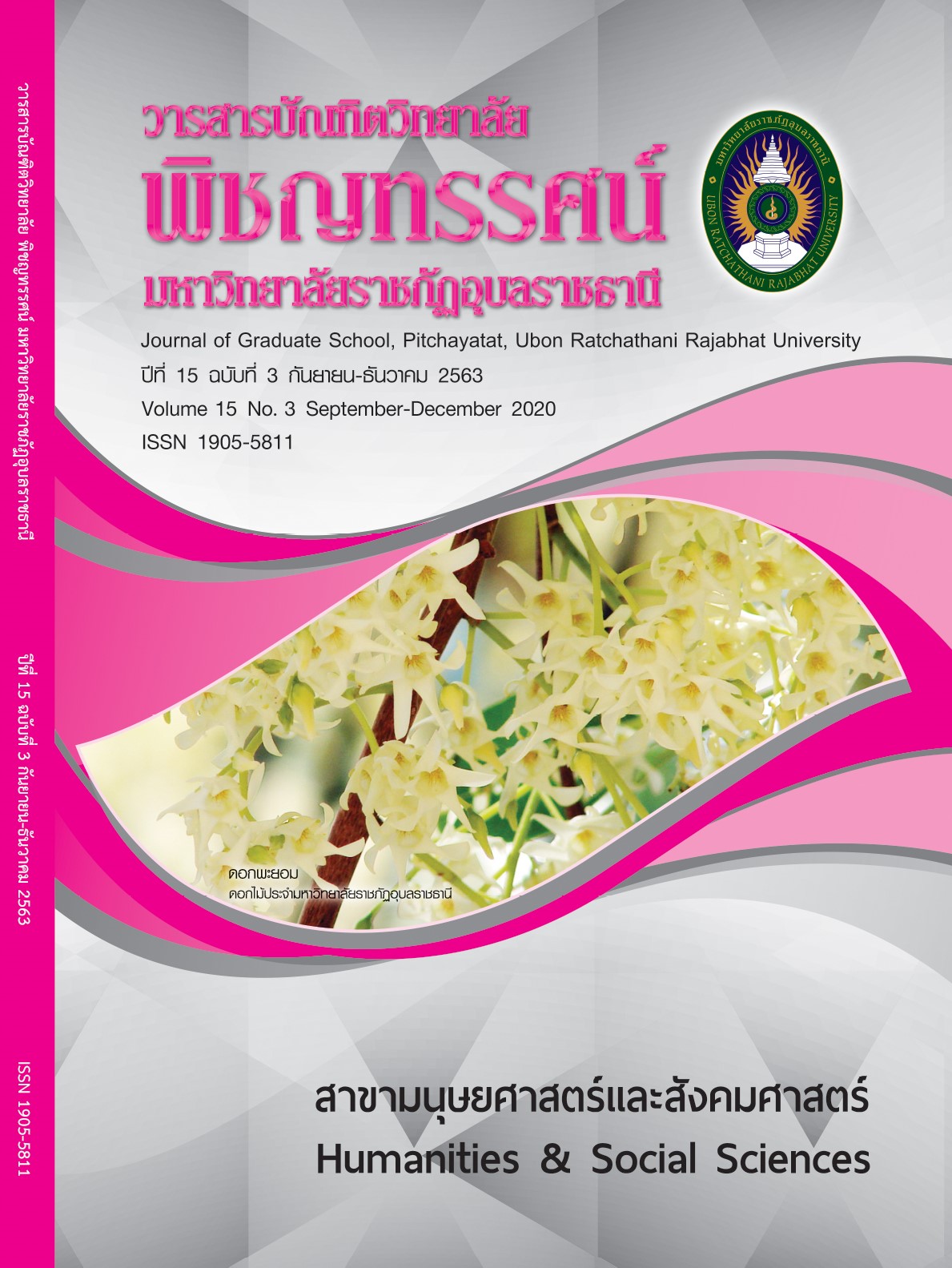การศึกษาแนวคิดทางการศึกษาของพระพรหมบัณฑิต
คำสำคัญ:
การศึกษา, แนวคิดทางการศึกษา, พระพรหมบัณฑิตบทคัดย่อ
การวิจัยนี้มีวัตถุประสงค์เพื่อ 1) ศึกษาประวัติและผลงานของพระพรหมบัณฑิต 2) วิเคราะห์แนวคิดทางการศึกษาของพระพรหมบัณฑิต และ 3) สังเคราะห์แนวคิดทางการศึกษาของพระพรหมบัณฑิต ซึ่งเป็นการวิจัยเชิงคุณภาพ โดยมีผู้ให้ข้อมูลสำคัญในการสัมภาษณ์คือพระพรหมบัณฑิต เครื่องมือวิจัยประกอบด้วย แบบวิเคราะห์เอกสาร แบบสัมภาษณ์ วิเคราะห์ข้อมูลด้วยการวิเคราะห์เนื้อหา
ผลการวิจัยพบว่า
- พระพรหมบัณฑิต เป็นพระนักวิชาการ นักบริหาร นักการศึกษา นักเทศน์ และนักเขียน ผู้มีผลงานมากมายทั้งภาษาไทย ภาษาบาลี และภาษาอังกฤษ มีผลงานทางวิชาการ งานวิจัย เป็นที่ได้รับการยอมรับอย่างกว้างขวางทั้งในและต่างประเทศ และแนวคิดทางการศึกษาของพระพรหมบัณฑิต ปรากฏในผลงานนิพนธ์ ตั้งแต่ปี พ.ศ. 2536 จนถึง พ.ศ. 2561 จำนวน 21 เล่ม
- การวิเคราะห์แนวคิดทางการศึกษาของพระพรหมบัณฑิตตามแนวทางการศึกษาของพระราชบัญญัติการศึกษาแห่งชาติ 9 ด้าน ได้แก่ 1) ความมุ่งหมายและหลักการ 2) สิทธิและหน้าที่ทางการศึกษา 3) ระบบการศึกษา 4) แนวการจัดการศึกษา 5) การบริหารและการจัดการศึกษา 6) มาตรฐานและการประกันคุณภาพการศึกษา 7) ครู คณาจารย์ และบุคลากรทางการศึกษา 8) ทรัพยากรเพื่อการศึกษา 9) เทคโนโลยีเพื่อการศึกษา
- การสังเคราะห์แนวคิดทางการศึกษาของพระพรหมบัณฑิตตามแนวทางการศึกษาของพระราชบัญญัติการศึกษาแห่งชาติ 9 ด้าน ได้แก่ 1) ความมุ่งหมายและหลักการ 2) สิทธิและหน้าที่ทางการศึกษา 3) ระบบการศึกษา 4) แนวการจัดการศึกษา 5) การบริหารและการจัดการศึกษา 6) มาตรฐานและการประกันคุณภาพการศึกษา 7) ครู คณาจารย์ และบุคลากรทางการศึกษา 8) ทรัพยากรเพื่อการศึกษา 9) เทคโนโลยีเพื่อการศึกษา
เอกสารอ้างอิง
จรูญรัตน์ ส่งศรี. การพัฒนารูปแบบการเสริมสร้างองค์การแห่งการเรียนรู้ในโรงเรียนตามแนววิถีพุทธ. วิทยานิพนธ์การศึกษาดุษฎีบัณฑิต มหาวิทยาลัยมหาสารคาม, 2554.
พระมหาญาณวัฒน์ ฐิตวฑฺฒโน (บุดดาวงษ์). การวิเคราะห์แนวคิดทางการศึกษาของพระพรหมคุณาภรณ์ (ป.อ.ปยุตฺโต). วิทยานิพนธ์พุทธศาสตรดุษฎีบัณฑิต มหาวิทยาลัยมหาจุฬาลงกรณราชวิทยาลัย, 2557.
วัฒนีย์ ปานจินดา. รูปแบบมหาวิทยาลัยไทยแนวพุทธ. วิทยานิพนธ์ปรัชญาดุษฎีบัณฑิต มหาวิทยาลัยมหาสารคาม, 2554.
พฤกษา เครือแสง. คุณภาพการศึกษาไทยกับมาตรฐานการบริการสาธารณะของรัฐ,” วารสารนักบริหาร. 35, 2 (กรกฎาคม-ธันวาคม 2558): 46-60.
พระปลัดสุรเชษฐ์ สุรเชฏฺโฐ. การศึกษากับการพัฒนาความเป็นมนุษย์. “วารสารวิชาการ สถาบันพัฒนาพระ วิทยากร,” 1, 2 (กรกฎาคม-ธันวาคม 2561): บทคัดย่อ.
ตวงเพชร สมศรี. “ระบบการทำงานของบุคคลต้นแบบเชิงพุทธบูรณาการ,” รายงานการวิจัย. บัณฑิต วิทยาลัย: มหาวิทยาลัยมหาจุฬาลงกรณราชวิทยาลัย, 2558.
สุวิธิดา จรุงเกียรติกุล. “การนำเสนอแนวทางการจัดการศึกษาตลอดชีวิตเพื่อขับเคลื่อนชุมชนการเรียนรู้ในบริบทสังคมและวัฒนธรรมของประเทศไทย” รายงานการวิจัย คณะครุศาสตร์: จุฬาลงกรณ์ราชวิทยาลัย, 2558.
เลขาธิการสภาการศึกษา, สำนักงาน. แผนการศึกษาแห่งชาติ พ.ศ. 2560-2579. กรุงเทพฯ: พริกหวานกราฟฟิค, 2560.
วิกิพีเดีย สารานุกรมเสรี. พระพรหมบัณฑิต (ประยูร ธมฺมจิตฺโต). (ออนไลน์) 2558 (อ้างเมื่อ 7 มกราคม 2561). จาก https://th.wikipedia.org/wiki/พระพรหมบัณฑิต_(ประยูร_ธมฺมจิตฺโต)
ดาวน์โหลด
เผยแพร่แล้ว
รูปแบบการอ้างอิง
ฉบับ
ประเภทบทความ
สัญญาอนุญาต
บทความทุกเรื่องได้รับการตรวจความถูกต้องทางวิชาการโดยผู้ทรงคุณวุฒิภายนอกอย่างน้อย 3 คน ความคิดเห็นในวารสารพิชญทรรศน์เป็นความคิดเห็นของผู้นิพนธ์มิใช่ความคิดเห็นของผู้จัดทำ จึงมิใช่ความรับผิดชอบของวารสารพิชญทรรศน์ และบทความในวารสารพิชญทรรศน์สงวนสิทธิ์ตามกฎหมายไทย การจะนำไปเผยแพร่ต้องได้รับอนุญาตเป็นลายลักษณ์อักษรจากกองบรรณาธิการ





